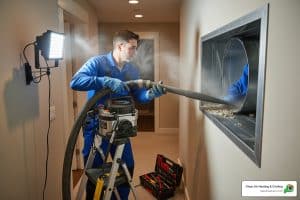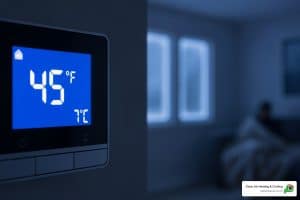Arlington WA air quality has been gaining attention for its normally satisfactory levels, ensuring that air pollution poses little or no risk to residents. For homeowners curious about the air they breathe, here’s what you need to know:
- Today’s Air Quality Status: Good
- Primary Pollutant: Ozone (O3) at 56.76 µg/m³
- Other Pollutants:
- Carbon Monoxide (CO): 310 µg/m³ (Good)
- Nitrogen Dioxide (NO2): 27.72 µg/m³ (Good)
- Particulate Matter (PM10): 1.61 µg/m³ (Good)
- Particulate Matter (PM2.5): 1.4 µg/m³ (Good)
- Sulfur Dioxide (SO2): 1 µg/m³ (Good)
These pollutants are present at levels that meet health guidelines, allowing for a clean, breathable atmosphere for outdoor activities.
My name is Colin Matei, and as the Owner and President of Clean Air Heating & Cooling, I have a deep commitment to enhancing air quality for residents across northwest Washington. I bring years of experience in providing reliable HVAC solutions, ensuring that the Arlington WA air quality remains a priority for everyone’s comfort and well-being.

Understanding Arlington WA Air Quality
The air quality in Arlington, WA, is typically considered good, which means that air pollution poses little or no risk to the health of its residents. But to truly understand Arlington WA air quality, dive into the specifics of the Air Quality Index (AQI) and the pollutants that are most commonly measured.
Air Quality Index (AQI)
The AQI is a tool used to communicate how polluted the air currently is or how polluted it is forecast to become. It ranges from 0 to 500, with lower values indicating better air quality. In Arlington, the AQI often reflects a status of “Good,” with minimal health risks.
Key Pollutants
Several pollutants contribute to the AQI, each with potential health impacts:
- Ozone (O3): This is the primary pollutant in Arlington, with a level of 56.76 µg/m³. Ozone at ground level is a harmful air pollutant, even though it forms naturally in the upper atmosphere. It can cause respiratory issues for sensitive groups.
- Carbon Monoxide (CO): Measured at 310 µg/m³, CO is a colorless, odorless gas that can be harmful when inhaled in large amounts. However, the current levels in Arlington are considered good.
- Nitrogen Dioxide (NO2): At 27.72 µg/m³, NO2 is another pollutant that can irritate the airways and aggravate respiratory diseases, but levels in Arlington remain low.
- Particulate Matter (PM10 and PM2.5): These tiny particles, at 1.61 µg/m³ for PM10 and 1.4 µg/m³ for PM2.5, can penetrate the lungs and even enter the bloodstream. Fortunately, the concentrations in Arlington meet health guidelines, minimizing risk.
- Sulfur Dioxide (SO2): With a level of 1 µg/m³, SO2 can affect the respiratory system, but its presence is minimal in Arlington.

Understanding these pollutants and their levels helps residents make informed decisions about their daily activities and health. For those interested in maintaining a clean environment indoors, companies like Clean Air Heating & Cooling offer solutions to ensure your home remains a safe haven from outdoor pollutants.
Causes of Air Quality Issues in Arlington WA
Even with Arlington WA air quality typically rated as “Good,” there are times when certain factors can lead to a temporary decline. Understanding these causes can help residents take steps to protect their health and improve the air they breathe.
Transportation
Vehicles are one of the primary sources of air pollution in Arlington. The emissions from cars, trucks, and buses release pollutants like nitrogen dioxide (NO2) and particulate matter (PM). These pollutants can contribute to smog and respiratory issues, especially in areas with heavy traffic.
Smoke from Wildfires
Wildfires are a significant concern in Washington state, particularly during the dry summer months. Smoke from these fires can drift into Arlington, carrying fine particulate matter (PM2.5) that poses health risks. This smoke can travel long distances, affecting air quality even when fires are not nearby.
Wood Burning
Many residents in Arlington use wood-burning stoves or fireplaces, especially during colder months. While cozy, these can release particulate matter and other pollutants into the air. This is a common issue in areas where wood is a primary source of heat.
Agricultural Burning
Agricultural activities around Arlington sometimes involve burning crop residues. This practice can release large amounts of smoke and pollutants into the air, temporarily affecting air quality. While necessary for some farming operations, it can contribute to increased levels of PM2.5 and other harmful substances.
By understanding these sources, residents can be more proactive in reducing exposure to pollutants. Solutions like using public transportation, reducing wood burning, and staying informed about air quality alerts can help maintain the health benefits of Arlington’s typically clean air.
Health Implications of Poor Air Quality
Poor air quality can have serious health effects, even in places like Arlington, WA, where the air is generally rated as “Good.” Understanding these implications is crucial, especially for sensitive groups such as children, the elderly, and those with pre-existing health conditions.
Respiratory Problems
Breathing polluted air can irritate your airways and lungs. This can lead to coughing, wheezing, and shortness of breath. For individuals with existing respiratory conditions like asthma, exposure to pollutants such as particulate matter (PM2.5 and PM10) and nitrogen dioxide (NO2) can trigger attacks or worsen symptoms.
Asthma
Asthma sufferers are particularly vulnerable to poor air quality. Pollutants can cause asthma attacks by inflaming the airways, leading to increased use of medication and more frequent doctor visits. During times of high pollution, those with asthma should monitor air quality forecasts and limit outdoor activities.
Heart Issues
Air pollution doesn’t just affect the lungs; it can also impact heart health. Fine particles like PM2.5 can enter the bloodstream, contributing to cardiovascular problems. Long-term exposure to poor air quality can increase the risk of heart attacks, strokes, and other heart-related diseases.
Sensitive Groups
Certain groups are more at risk when it comes to air pollution. Children, whose lungs are still developing, and older adults, who may have weakened immune systems, are more susceptible. People with pre-existing health conditions, such as respiratory or heart diseases, also face higher risks. It’s crucial for these groups to stay informed about air quality levels and take precautions during periods of poor air quality.
By being aware of these health implications, Arlington residents can take proactive steps to protect themselves and their families. This includes staying indoors during high pollution days, using air purifiers, and keeping up-to-date with air quality alerts.
Monitoring and Improving Air Quality
To protect yourself and your loved ones from the harmful effects of air pollution, it’s important to stay informed about Arlington WA air quality. Here’s how you can keep track and take action:
Air Quality Forecast
The air quality forecast provides a daily snapshot of expected pollution levels. In Arlington, WA, air quality is typically rated as “Good,” meaning the air is clean and safe for most people. However, forecasts can change, especially during events like wildfires or high traffic days. Check local forecasts regularly to plan your outdoor activities.
Pollution Monitors
Pollution monitors are scattered throughout Arlington to measure levels of various pollutants, such as ozone (O3), nitrogen dioxide (NO2), and particulate matter (PM2.5 and PM10). These monitors provide real-time data that contribute to the Air Quality Index (AQI), a scale that helps you understand how clean or polluted the air is.
Air Quality Alerts
Air quality alerts are issued when pollution levels are expected to reach unhealthy levels. These alerts are especially crucial for sensitive groups like children, the elderly, and people with pre-existing health conditions. Sign up for alerts through local news channels or online services to receive timely notifications.
Reducing Exposure
- Stay Indoors: On days when the AQI is high, limit outdoor activities, especially strenuous exercises like running or cycling.
- Use Air Purifiers: Consider using air purifiers at home to reduce indoor pollution levels. Look for devices with HEPA filters to capture fine particles.
- Close Windows: Keep windows and doors closed during high pollution days to prevent outdoor air from entering your home.
- Avoid Smoking: Smoking indoors can significantly worsen air quality, so step outside if you need to smoke.
By staying informed and taking these precautions, you can minimize your exposure to pollutants and protect your health. Next, we’ll tackle some common questions about air quality in Arlington, WA.
Frequently Asked Questions about Arlington WA Air Quality
What is the air quality forecast for Arlington WA?
The air quality in Arlington, WA, is generally rated as “Good,” with low levels of pollutants like PM2.5 and ozone. However, this can vary due to factors like weather conditions and local events. For example, during wildfires or high traffic days, pollution levels might rise, affecting sensitive groups such as children, the elderly, and those with respiratory issues. It’s a good idea to check the air quality forecast regularly to plan your outdoor activities accordingly.
What is causing the bad air quality in Washington state?
Several factors contribute to poor air quality in Washington state, including:
- Transportation: Vehicle emissions are a significant source of air pollution, particularly in urban areas with heavy traffic.
- Smoke from Wildfires: During wildfire season, smoke can drastically reduce air quality, affecting large areas even if the fires are not nearby.
- Wood Burning and Agricultural Burning: These activities release smoke and other pollutants into the air, contributing to higher AQI levels.
Understanding these causes can help in taking appropriate measures to protect your health.
At what AQI should you stay inside?
The Air Quality Index (AQI) is a helpful tool to determine when to limit outdoor activities. Here’s a quick guide:
- 0-50 (Good): Air quality is satisfactory, and air pollution poses little or no risk.
- 51-100 (Moderate): Air quality is acceptable; however, there may be a risk for some people, particularly those who are unusually sensitive to air pollution.
- 101-150 (Unhealthy for Sensitive Groups): Sensitive groups may experience health effects, but the general public is not likely to be affected.
- 151-200 (Unhealthy): Everyone may begin to experience health effects; sensitive groups may experience more serious effects.
- 201-300 (Very Unhealthy): Health alert; everyone may experience more serious health effects.
- 301-500 (Hazardous): Health warnings of emergency conditions; the entire population is more likely to be affected.
On days when the AQI exceeds 100, it’s wise for sensitive groups to stay indoors and limit physical exertion. For AQI levels above 150, everyone should consider staying inside to avoid potential health risks.
Conclusion
At Clean Air Heating & Cooling, we believe that everyone deserves to breathe clean, healthy air. That’s why we are committed to providing top-notch air quality services to the residents of Arlington, WA, and the surrounding areas. Our focus is not just on heating and cooling, but also on ensuring the air in your home is as fresh and clean as possible.
With our expertise in air quality solutions, we can help you tackle any air quality issues your home might face. Whether it’s installing the latest air filtration systems or performing routine maintenance, our team is dedicated to improving indoor air quality. We understand the importance of clean air, especially when outdoor conditions might not always be ideal.
Customer satisfaction is our top priority. With over 480 5-star Google reviews, our commitment to providing prompt, reliable service is evident. We treat every customer like family and strive to build lasting relationships based on trust and quality service.
If you’re concerned about air quality in your home or need assistance with your HVAC system, don’t hesitate to reach out to us. We’re here to help you breathe easier and live more comfortably.
Get in touch with us today for expert air quality services in Arlington, WA.
By addressing Arlington WA air quality issues with effective solutions, Clean Air Heating & Cooling ensures that you can enjoy a healthier and more comfortable living environment.





